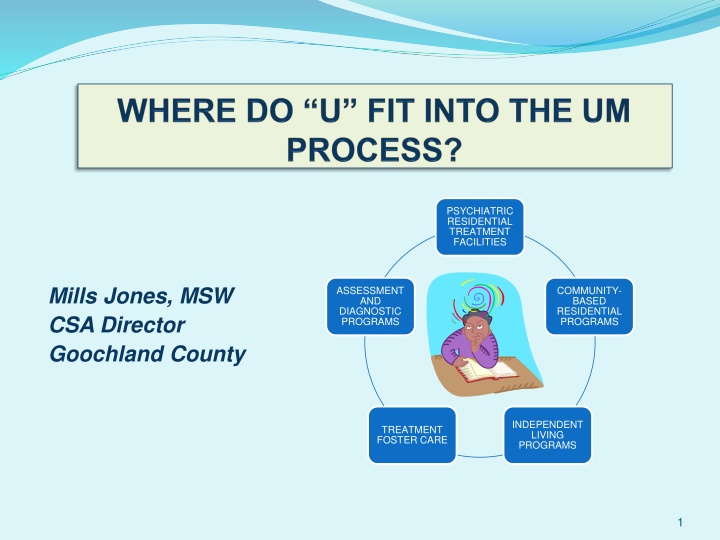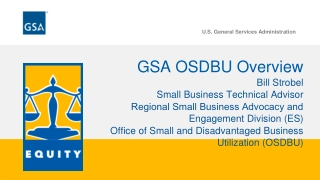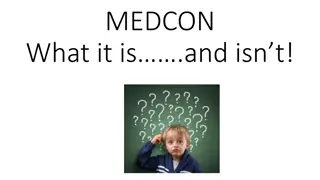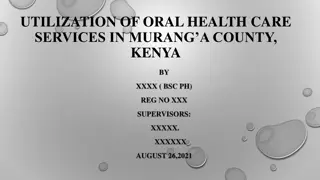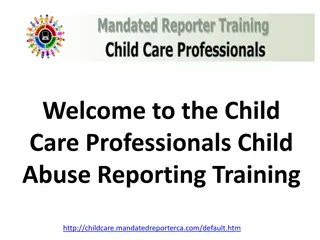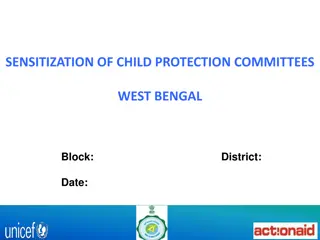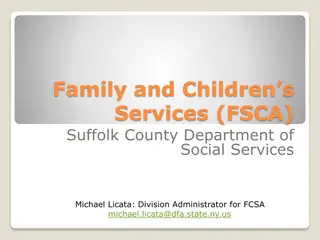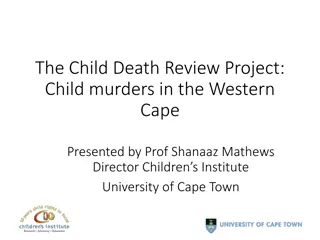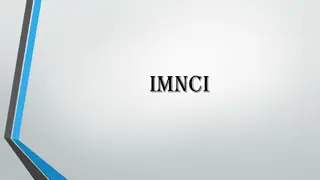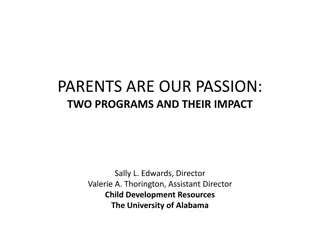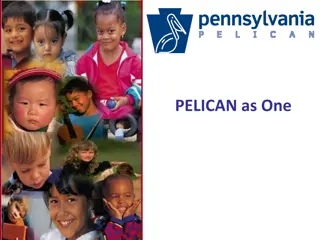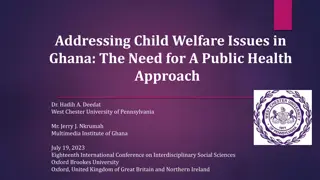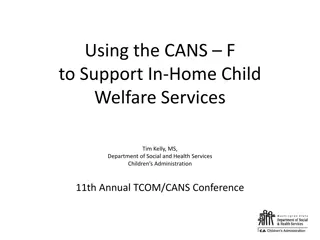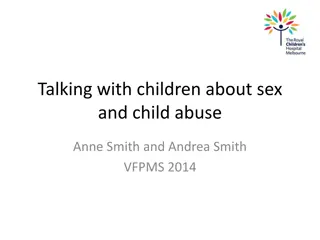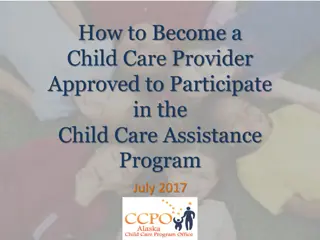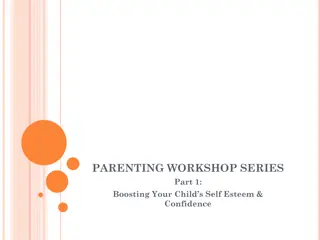Utilization Management in Child Services: Role and Responsibilities
This content delves into the role of Utilization Management (UM) in child services, focusing on the supervision and evaluation of services provided to youth. It discusses the responsibilities of case managers in coordinating with various stakeholders and evaluating the need for continued services. The document also covers objectives related to different levels of service for youth and their families in psychiatric residential treatment facilities, community-based programs, and more.
Download Presentation

Please find below an Image/Link to download the presentation.
The content on the website is provided AS IS for your information and personal use only. It may not be sold, licensed, or shared on other websites without obtaining consent from the author.If you encounter any issues during the download, it is possible that the publisher has removed the file from their server.
You are allowed to download the files provided on this website for personal or commercial use, subject to the condition that they are used lawfully. All files are the property of their respective owners.
The content on the website is provided AS IS for your information and personal use only. It may not be sold, licensed, or shared on other websites without obtaining consent from the author.
E N D
Presentation Transcript
PSYCHIATRIC RESIDENTIAL TREATMENT FACILITIES Mills Jones, MSW CSA Director Goochland County ASSESSMENT AND DIAGNOSTIC PROGRAMS COMMUNITY- BASED RESIDENTIAL PROGRAMS INDEPENDENT LIVING PROGRAMS TREATMENT FOSTER CARE 1
PRINCE WILLIAM COUNTY CSA CSA Staff: 1 CSA Director 2 UM Coordinators 2 Admin Staff Budget: $7.5M March 2013 2
GOOCHLAND COUNTY CSA CSA Staff: CSA Director Budget: $1.07M March 2013 3
CSA POPULATION Current Service Residential Treatment Centers Community-Based Residential Treatment Foster Care Family Foster Care SPED Private Day CSA Other Total Youths Served- FY14 Goochland 2 0 6 5 7 0 34 Prince William 22 18 11 106 33 475+ 700+ March 2014 4
OBJECTIVES Utilization Management Definition Role of Case Manager Role of UM CSA Identify Different Levels Of Service For Youth and Their Families Psychiatric Residential Treatment Facilities Community-Based Residential Programs Assessment and Diagnostic Programs Independent Living Programs Treatment Foster Care Become Familiar With Basic Standards Of Service For Providers Review Basic Service Requirements Identify Key Areas To Evaluate Service Quality 5
UTILIZATION MANAGEMENT Definition: THE EVALUATION OF ALL SERVICES CONSIDERED, APPROVED, AND PROVIDED FAPTs QA & COMPLIANCE WITH STATE AND LOCAL POLICIES AND PROCEDURES CASE MGRs CPMTs UM CLIENTS PROVIDERS 6
UTILIZATION MANAGEMENT Role of the Case Manager SUPERVISE THE SERVICES PROVIDED TO THE YOUTH INTERFACE WITH CLIENTS PARENTS, GUARDIANS & YOUTH PROVIDE INPUT DURING THE TREATMENT TEAM MEETING CASE MANAGER ADDRESS ISSUES WITH SERVICE DELIVERY COORDINATE WITH CSA, UM COORDINATOR, FAPT EVALUATE THE NEED FOR CONTINUED SERVICES 7
LIST OF UM ACTIVITIES OUTCOME MEASURES Tx. TEAM MEETINGS NEEDS VS. SERVICES PAPER REVIEW CANS CON RECORDS MEDICAID VEMAT DO THEY MATCH? LIAISON BETWEEN PROVIDERS AND CASE MANAGERS REVIEW REPORTS FAPTS SITE VISITS CASE STAFFING 8
UTILIZATION MANAGEMENT QUESTIONS FOR ALL LEVELS OF SERVICE Are Goals And Services Specific To The Needs Of The Youth? Does The Discharge Plan Match The FAPT/Court Approved Plan And Lead To A Step-Down To A Lower Level Of Care? Is The Family Actively Involved In Treatment Planning And Service Provision? (Treatment Teams, Staffing, Etc). Is The Youth Making Progress Towards Meeting The Criteria For Completing Their Goals? What Is The Program Doing To Help The Youth Reach Their Goals? If The Youth Is Not Making Progress, What Program Changes Will Be Made To Assist The Youth To Get On Track? Is The Discharge Plan Realistic Not Based On Program Length? 9
UTILIZATION MANAGEMENT Role of the UM Coordinator/CSA/FAPT SUPPORT THE CASE MANAGER OPTIMIZE THE USE OF MEDICAID AND OTHER NON-CSA FUNDS UM COORDINATOR CSA/FAPT LIAISON BETWEEN CASE MGRS AND PROVIDERS MAINTAIN QUALITY CONTROL 10
PSYCHIATRIC RESIDENTIAL TREATMENT FACILITIES 11
PSYCHIATRIC RESIDENTIAL TREATMENT FACILITIES EXAMPLES Program Designs House Style Campus Style Psych Facility (locked) Psych facility w/ acute Provider Examples Fair Winds UMFS Hallmark Poplar Springs * Education Services Provided on-site * 12
PSYCHIATRIC RESIDENTIAL TREATMENT FACILITIES COMPLETED BY THE 14TH DAY AFTER ADMISSION INPUTS CASE MANAGER FAPT YOUTH YOUTH S PARENTS LEGAL GUARDIANS OTHER RESPONSIBLE PARTIES COMPREHENSIVE PLAN OF CARE INITIAL PLAN OF CARE (COMPLETED AT ADMISSION) 13
PSYCHIATRIC RESIDENTIAL TREATMENT FACILITIES Therapy 21 sessions/week PSYCHIATRIC RESIDENTIAL TREATMENT FACILITIES DISCHARGE PLANNING Family Therapy- Minimum Twice/month * Case Manager should address the issue if family is not participating in therapy * Discharge Planning: Active treatment and comprehensive planning for aftercare services. Planning for discharge, placement, and treatment must begin at admission. 14
PSYCHIATRIC RESIDENTIAL TREATMENT FACILITIES Treatment Plan Reviews: The treatment plan must be updated every 30 days and revised to address goals achieved, unresolved problems, and any new problems which have arisen. PARTICIPANTS RTC STAFF CSA CASE MANAGER YOUTH FAMILY participate in treatment planning conduct on-site visits review youth s charts conduct interviews address issues UM COORDINATOR/CSA 15
PSYCHIATRIC RESIDENTIAL TREATMENT FACILITIES THERAPEUTIC PASSES Therapeutic passes are permitted if the goals of the pass are part of the master treatment plan. The goals of a particular visit must be documented prior to granting the pass and, on return, its effects must be documented. Passes should begin with short lengths of time (e.g., 2-4 hours) and progress to a day pass. The function of the pass is to assess the recipient s ability to function outside the structured environment and to function appropriately within the family and community. Overnight passes may occur only after the completion and documentation of successful day passes and as a part of the discharge plan. No more than 18 days of therapeutic leave annually are billable. Days of leave are counted from the date of admission to Medicaid-covered service. 16
PSYCHIATRIC RESIDENTIAL TREATMENT FACILITIES UTILIZATION REVIEW SPECIFIC QUESTIONS TO ASK ARE THE YOUTH AND FAMILY ACTIVELY PARTICIPATING IN THERAPY? ARE THE EDUCATIONAL SERVICES FOLLOWING THE IEP? WHAT IS THE STATUS OF YOUTH S MEDICAID? IS THERE ADEQUATE COMMUNICATION WITH THE REFERRAL SOURCE? IS THE FACILITY SAFE AND CLEAN? WHAT ACTIONS WERE TAKEN AND ARE PLANNED THAT SUPPORT THE DISCHARGE PLAN? 17
ASSESSMENT AND DIAGNOSTIC PROGRAMS OVERVIEW 30-90 day program designed to assess the emotional, behavioral, educational, and medical needs of youth. Designed for youth new to care or youth who have not responded well to traditional interventions (e.g. Therapy, Intensive In-Home Services, Medication Management). Program should respond to the needs of the youth (and family). ASSESSMENT NEEDS PROGRAM DESIGN AND DELIVERY 19
ASSESSMENT AND DIAGNOSTIC PROGRAMS EXAMPLES GROUP HOME RESIDENTIAL Kids in Focus Intercept - Fresh Start Grafton, North Spring Newport News Beh. Ctr Hallmark Partial Medicaid Reimbursement Residential cost may be Medicaid reimbursed 20
ASSESSMENT AND DIAGNOSTIC PROGRAMS UTILIZATION REVIEW UTILIZATION REVIEW - WHAT TO ASSESS? SPECIFIC QUESTIONS TO ASK Are The Program s Recommendations Congruent With Your CSA Policies, Practices, And Fiscal Resources? Is The Recommendation Youth Specific? If So, Are The Case Manager And FAPT Providing The Appropriate Services For The Youth And Family? If Not, Are The Case Manager And FAPT Providing Appropriate Justification For Alternative Services? Are The Alternative Services Addressing The Youth s Needs? 21
COMMUNITY-BASED RESIDENTIAL PROGRAMS GROUP HOMES 22
COMMUNITY - BASED RESIDENTIAL FACILITIES OVERVIEW DSS DBHDS (Mental Health) Licensed Facility Licensed Facility Average 4-8 beds/home Independent Living Curriculum Requires Quarterly Treatment Plan reviews Awake supervision required Minimum1:8 staffing ratio Outpatient therapy- weekly Can accept indigent youth w/o mental health issues IQ 70+ Average 4-8 beds/home. Independent Living Curriculum Requires Quarterly Treatment Plan reviews Awake supervision required Minimum 1:6 Staffing ratio Therapy provided on site- weekly Must have DSM-IV diagnosis. Can Accept IQ <70 depending on program design. Most are partially Medicaid Funded All are partially Medicaid funded 23
COMMUNITY - BASED RESIDENTIAL FACILITIES DEVELOPING THE PLAN AND PROGRESS REPORT There shall be documentation showing the involvement of the following parties, unless clearly inappropriate, in developing and updating the individualized service plan and in developing the quarterly progress report. Who should participate? The Resident The Resident's Family, If Appropriate, And Legal Guardian The Case Manager Facility Staff UM Coordinator 24
COMMUNITY - BASED RESIDENTIAL FACILITIES INDIVIDUALIZED SERVICE PLANS Individualized service plans shall be developed within 30 days following admission and describe in measurable terms the: Strength And Needs Of The Resident Resident's Current Level Of Functioning Goals, Objectives And Strategies Established For The Resident Projected Family Involvement Projected Date For Accomplishing Each Objective Status Of The Projected Discharge Plan And Estimated Length Of Stay 25
COMMUNITY - BASED RESIDENTIAL FACILITIES REVIEWS A documented quarterly review of each resident s progress towards completion of the initial service plan and within each 90-day period thereafter assessing: Resident s Progress Toward Meeting The Plans Objectives Family s Involvement Continuing Needs Of The Resident Resident s Progress Towards Discharge Status Of Discharge Planning 26
COMMUNITY - BASED RESIDENTIAL FACILITIES UTILIZATION REVIEW SPECIFIC QUESTIONS TO ASK Is The Child Receiving Therapy As Prescribed? Are Psycho-Educational Activities Documented? Are Independent Living Services Provided? Are Services Being Provided According To Regulations? Are The Family And Case Managers Actively Involved In Treatment Planning And Service Provision? Does The Provider Offer A Clean, Safe, Therapeutic Environment? 27
INDEPENDENT LIVING PROGRAMS TYPES APARTMENT STYLE - DSS Licensed Child Placing Agency or Unlicensed GROUP HOME Licensed or Unlicensed 29
INDEPENDENT LIVING PROGRAMS UTILIZATION REVIEW SPECIFIC QUESTIONS TO ASK Is The Youth Abiding By The Rules Of The Program? Is The Youth Working And/Or In School? Is The Youth Maintaining A Savings Account? What Independent Living Skills Are Being Taught? What Is The Plan For Discharge From The Program? Are Goals And Services Based On The Ansell Casey Life Skills Assessment? Does the level of supervision meet the youth s needs? 30
TREATMENT FOSTER CARE Treatment foster care involves placement of children with foster families who have been specially trained to care for children with certain medical or behavioral needs. Examples include medically fragile children, children with emotional or behavioral disorders, and HIV+ children. Treatment foster care programs generally: Require more training for foster parents; Provide more support for children and caregivers than regular family foster care; Have lower limits on the number of children that can be cared for in the home. Therapeutic foster care is preferred over residential or group care because it maintains children in a family setting. 32
TREATMENT FOSTER CARE CHILD PLACING AGENCIES (TFC) CHILD PLACING AGENCIES ARE LICENSED BY THE VIRGINIA DEPARTMENT OF SOCIAL SERVICES. ALL CONTRACTED PROVIDERS SHOULD ALSO MEET MEDICAID REQUIREMENTS FOR CASE MANAGEMENT. 33
TREATMENT FOSTER CARE TREATMENT FOSTER CARE SERVICES Coordination Of The Treatment Team Smaller Caseloads (6-12 Youth Per TFC Agency Case Manager) Development Of Treatment Plan And Monthly/Quarterly Updates Supervise the Implementation Of Treatment Services: Ex: Medical, Educational, Psychiatric, Psychological, Family Contact Provide 24-Hour On Call Services To Families. 34
TREATMENT FOSTER CARE CLIENT CONTACTS (MEDICAID REQUIREMENTS FOR THE TFC AGENCY CASE MANAGER) There shall be face-to-face contact between the case manager and the child, based upon the child s treatment and service plan and as often as necessary, to ensure that the child is receiving safe and effective services. Face-to-face contacts shall be no less than twice a month, one of which shall be in the foster home. One of the contacts shall include the child and at least one treatment foster parent and shall assess the relationship between the child and the treatment foster parents. The contacts shall assess the child s progress, provide training and guidance to the foster parents, monitor service delivery, and allow the child to communicate concerns. Children who are able to communicate shall be interviewed privately at least once a month. 35
TREATMENT FOSTER CARE LEVELS OF CARE TFC Agencies Have Different Levels Of Service Depending On The Documented Needs Of The Child. This Varies From Agency To Agency. LEVELS OF SERVICE Levels Generally Differ In Amount Of Client Contact Collateral Services On-call Services Provided NEEDS OF THE CHILD AGENCY POLICY Levels Should Drop As The Service Needs Decrease. 36
Guidelines for Determining Levels of Care for Foster Care Placement with Licensed Child Placing Agencies (LCPAs) Effective July 1, 2014,when purchasing foster care services through a Licensed Child Placing agency, , [CPMT} shall ensure that levels of care are appropriately matched to a child or youth in accordance with the SEC Guidelines for Determining Levels of Care for Foster Care Services with Licensed Child Placing Agencies. 37
Standardization of Levels of Foster Care provided by Licensed Child Placing Agencies Non-Treatment Foster Care Level 1 Treatment Foster Care Assessment Treatment Level Level 2 Treatment Foster Care Level 3 Treatment Foster Care 38
Guidelines for Determining Level of Care- Highlights Determine service level based on the child s needs. 1. The FAPT/MDT should work collaboratively in the process. 2. Children shall be placed on the Assessment Level upon initial placement with an LCPA. 3. LCPA shall provide the assessment to the FAPT with recommendations. 4. Determination of Levels shall be based on factors such as child s needs and strengths, behaviors, CANS scores, VEMAT, psychological, educational, and behavioral evaluations, etc. 5. 39
TREATMENT FOSTER CARE UTILIZATION REVIEW SPECIFIC QUESTIONS TO ASK Is The Agency Making The Required Number Of Client Contacts? Are Treatment Goals Monitored During Home Visits? Are Independent Living Services Provided? How Active Are The TFC Parents In The Child s Treatment? Does The TFC Home Meet The Child s Needs? If Appropriate, Does The TFC Family Interact With The Biological Family? 40
SUMMARY - UM ACTIVITIES CLIENTS FAPT CPMT UTILIZATION MGMT. PROVIDER CASE MGR RELY ON OTHER LOCALITIES FOR RESOURCES 41
RESOURCES 42
SERVICE LEVEL OVERVIEW PSYCHIATRIC RESIDENTIAL TREATMENT FACILITY (LEVEL C) DBHDS Licensed Clinical Treatment Team milieu Can be > 16 beds Placement Medicaid reimbursable excluding educational services Must provide therapeutic, psychiatric services/interventions; minimum of 21 wkly therapy sessions, 2 monthly family sessions Ind. Plan of care - @ admission Comprehensive Plan by 14 days of admission Discharge Plan begins @ admission Treatment Plan Reviews every 30 days Therapeutic passes permitted Must provide educational services Must have Certificate of Need (CON) signed by physician indicating medical necessity Must have DSM-IV diagnosis COMMUNITY BASED RESIDENTIAL SERVICES (LEVEL B) DBHDS Licensed Staff ratio 1 to 4 youth Must be < 16 beds Therapeutic Behavioral Services Medicaid reimbursable COMMUNITY BASED RESIDENTIAL SERVICES (LEVEL A) DSS, DJJ or DOE Licensed Staff ratio 1 to 6 youth Must be < 16 beds Community-based Residential Services Medicaid reimbursable COMMUNITY BASED RESIDENTIAL SERVICES NON MEDICAID DSS, DJJ, and/or DOE Licensed Staff ratio 1 to 8 youth Can be > 16 beds No Medicaid reimbursable services for residential placement Must provide weekly on site therapeutic services and arrange for psychiatric care Must provide active mental health treatment Must provide structured level of care therapy, if provided, must be with a licensed professional Ind. Service Plan (ISP) within 30 days of admission Discharge Planning included in ISP Documented Quarterly Reviews of ISP Ind. Service Plan (ISP) within 30 days of admission Discharge Planning included in ISP Documented Quarterly Reviews of ISP Ind. Service Plan (ISP) within 30 days of admission Discharge Planning included in ISP Documented Quarterly Reviews of ISP May use Public Education May use Public Education May use Public Education Must have CON Must have CON CON not necessary for Admission Must have DSM-IV diagnosis Must have DSM-IV diagnosis DSM-IV Diagnosis not necessary for Admission 43
Resource- Licensing Standards SERVICE Treatment Foster Care Licensing Website www.dss.virginia.gov/facility/search/cpa.cgi Level A Residential Homes www.dss.virginia.gov/facility/search/crf.cgi Level B Residential Homes http://lpss.dbhds.virginia.gov/ Residential Treatment Centers http://lpss.dbhds.virginia.gov/ 44
CASE MANAGER FEEDBACK FOR FAPT PROVIDER SERVICES FAPT Case Managers are asked to fill out this brief survey regarding current experiences with your FAPT Service Providers. Your Agency (circle one): CS CSU DSS EDU SERVICE PROVIDER/VENDOR NAME:____________________________________________ CASE MANAGER NAME______________________________________ DATE__________________ EVALUATION OF SERVICE PROVIDER: Rate the quality of the service provider below. Use a scale of 1 to 5 (1= poor; 2= fair; 3= good; 4= excellent; 5= superior), (n/a = not applicable). Evaluate all service measures by placing an x under the appropriate column rating: Rating for Provider PROVIDER SERVICE MEASURE Demonstrates the ability to assess youth's strengths and service needs Demonstrates the ability to assess family's strengths and service needs Timeliness providing appropriate educational services to youth Timeliness providing therapy/parenting services to family Timeliness in providing monthly reports to case manager Successfully engages youth in treatment process Successfully engages youth s family in treatment process Delivers services in a professional & competent manner to the youth Delivers services in a professional & competent manner to the youth s family Coordinates service adjustments with case manager Responds appropriately to case manager's requests and directions Coordinates end-of-service planning with next provider & family Prepares family members to maintain success after end-of-service + Please feel free to include comments on the above measures or on other issues concerning the youth, guardian/family and/or provider: 1 2 3 4 5 n/a 45
CSA Office Goochland County Provider Evaluation Form CSA Office Goochland County Provider Evaluation Form FAPT Version Provider: Provider Representative Date of FAPT Meeting FAPT Case # 0 =Unsatisfactory 1 =Satisfactory 2 = Very Satisfactory Critical Areas: Provider Representative was prepared for the FAPT meeting (i.e. arrived on time, appropriate appearance, knowledgeable of the youth s issues) 0 1 2 Provider s Reports were (1) available, (2) well-written, (3) addressed treatment issues, and (4) timely. Provider was able to answer FAPT questions regarding client progress, and service delivery, according to all FAPT domains. Provider discussed specific plans for discharge including step down to lower levels of care. Youth was present for the FAPT meeting and appearance was appropriate (neat, well-groomed). The Services provided meet the expectations of the FAPT in regards to the DSS Foster Care Service Plan and IFSP. Comments: FAPT discussed and resolved issue with Provider during meeting: YES/ NO Provider s Management notified of areas of concern: YES/ NO Notes: DATE: __________ 46 46
RESIDENTIAL FILE REVIEW GROUP HOME Child Facility Admit Date Age Date of Review Discharge Date Assessments: Y N N/A Comments Is Application in file? Is the application complete? Is a Social History Done? Are Pertinent Clinical Issues for Treatment Assessed Service Plan Are issues raised in assessment section addressed in the service plan? Are services to move the child towards IL addressed in the plan? (For children 16+) Are goals child specific? Was Referral worker consulted in development of the plan? Discharge Plan? Quarterly/ Monthly Reports Are reports present in the file? Do reports address progress towards all treatment plan goals? Are incidents/ behaviors described in detail? Are services provided to achieve goals documented in report? Treatment Progress- Has progress been documented for the past 3 months? 6 months? Goal 1: Progress: Measurable criteria for progress, services to meet goals, changes needed to ISP to facilitate change. Y N N/A Comments Serious Incident Reports Have behaviors required SIR s? Are the interventions appropriate? Are there concerns raised from SIR s? Medical/ Dental Medication Logs in record Physical/Dental exam up to date Medical Issues Services Is child receiving Individual/Group Therapy? Documentation? How many times per week? Is the child involved in Community Activities? Is there Family Involvement? Are the Educational Services meeting the child s needs/IEP requirements? Are there IL Services? Other Services? 47
TFC File Review General Agency Information: Agency Name Reviewer Date of Review Announced? Y/N Levels of Service (with criteria): 48
Assessment Information Y N Date Issues Application for Placement Intake Assessment Social History Document Y N Date GOALS Attach document Initial Treatment Plan Does Plan address immediate services to be provided in the first 45 days? N/A 49
Comprehensive Treatment Plan Attach document Are Goals Measurable? Do goals address issues documented in assessments? Home Visits Are Home Visits/Client contacts documented in the record? Does the frequency of client contacts/home visits match the level of care? Y N Comments Does Documentation show Treatment goals addressed? Does Documentation show interventions used to assist youth to achieve goals? Does documentation of Individual Client sessions document issues discussed? Total Contacts/ month required by level: ________________ 50
